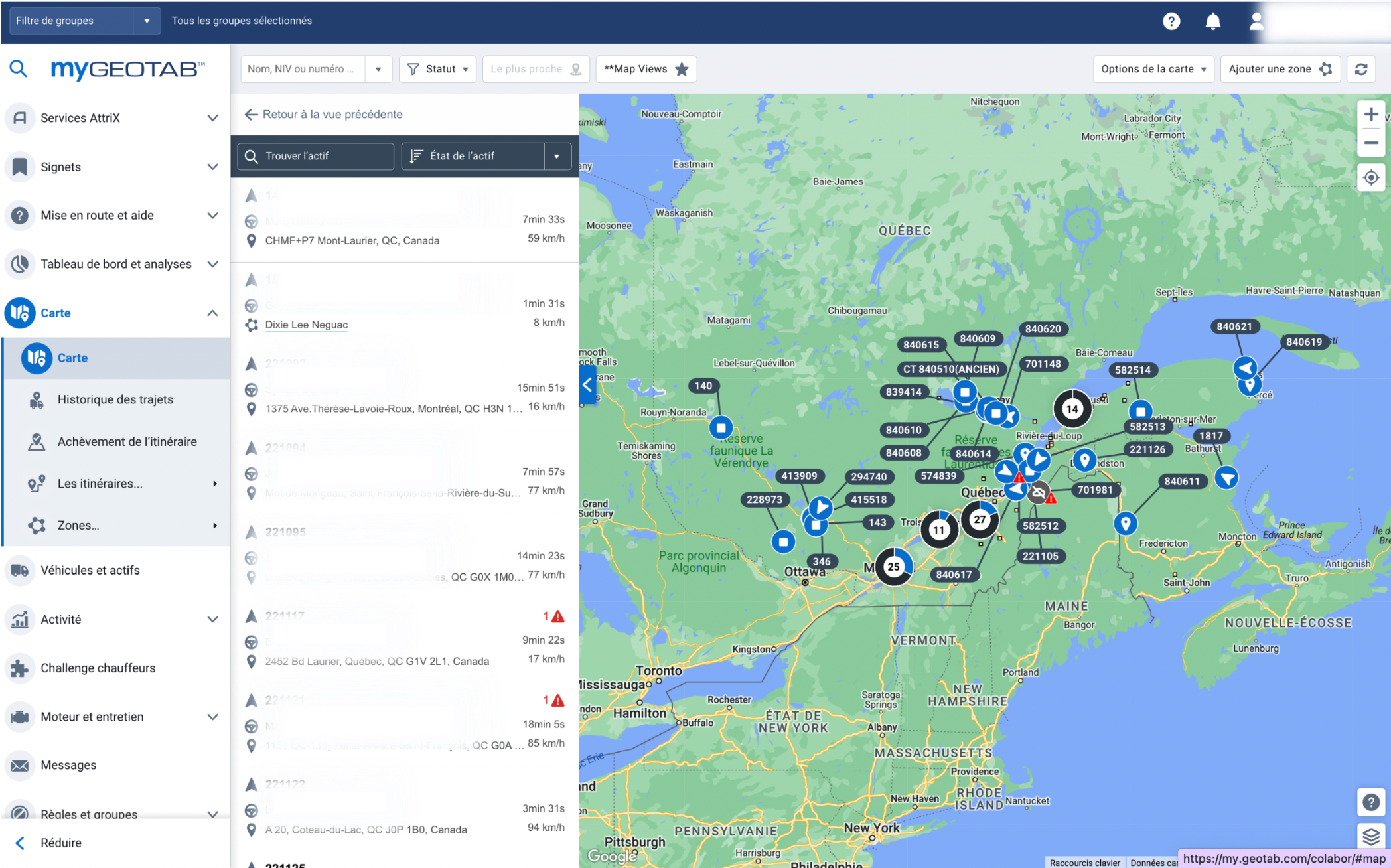Commercial Fleet Management: Strategies, Tools & Tips
Commercial fleet management plays a vital role in keeping businesses running smoothly, especially in industries like transportation, logistics, and...
Keep an eye on the road
Simplify your driver's routine
For efficient decision making
Ensure the compliance of your fleet
Simplify the daily life of your drivers
Maximize the value of your data
Unparalleled monitoring of your assets
The friendly competition that pays off
Planning powered by data
Exceed your customers' expectations
Provide better service to your users
Maximize the satisfaction of your citizens
Simplify your daily life on the construction site
Facilitate the electrification of your fleet
Our experts meet your needs
Easily meet the standards
Improve the safety of your drivers
Protect your data and your fleet
6 min read
AttriX
Jan 26, 2024 3:13:24 PM

Managing a fleet in Canada requires a deep understanding of complex federal and provincial regulations, environmental mandates, and technological innovations. Compliance with these rules is not just a legal requirement but a crucial part of any strategic fleet management plan. Our comprehensive guide offers a clear and confident overview of Canadian fleet compliance, providing expert guidance in a complicated landscape.
Whether you're managing a fleet in a bustling city like Montreal, Toronto or Vancouver or across the vast highways of Canada, our guide will help you navigate the intricacies of compliance and confidently optimize your fleet operations. Compliance isn't just about following the rules; it's about implementing best practices and excelling in fleet management.
Join us on this journey through the world of fleet management and discover the art of compliance with confidence, about steering your fleet towards efficiency, safety, and success.
Mastering fleet compliance in Canada is a pivotal and ongoing challenge for any fleet manager. A comprehensive understanding of this complex landscape is crucial for ensuring fleet operations adhere to legal standards and industry best practices.
A network of federal and provincial laws governs Canada's compliance with fleet regulations. Federal regulations set a baseline of standards that apply uniformly across the country, ensuring that important aspects such as vehicle safety standards, emissions regulations, and the transportation of hazardous materials are met. However, provincial regulations can add additional requirements.
Fleet compliance in Canada is not just about vehicle maintenance and adhering to the rules of the road. It encompasses a broader spectrum of legislative requirements, which include:
This act regulates commercial motor vehicles, vehicle drivers, vehicle safety, and interstate transportation. Compliance with this act is critical for ensuring the safety of fleet operations across provincial and national borders.
Under this act, fleets must adhere to environmental standards, especially regarding vehicle emissions. It's crucial for fleet managers to ensure their vehicles meet these standards to avoid penalties and contribute to environmental sustainability.
This act sets standards for the transport of hazardous materials in commercial vehicles, requiring specific documentation, safety measures, and training for drivers. Compliance with this act is critical for fleets that transport dangerous goods, ensuring public safety and environmental protection.
Different industries have specific regulatory needs. For instance, fleets transporting perishable goods must comply with food safety regulations, while commercial drivers and those involved in construction might face additional safety and equipment standards.
Refrigerated Transport: Requires adherence to temperature control standards.
Heavy Machinery Transportation: Must comply with specific load and securing regulations.
The path to maintaining fleet compliance in Canada is laden with challenges, each requiring careful navigation and strategic management. This part delves into fleet managers' primary hurdles in ensuring their fleets meet regulatory standards.
Canada's intricate web of federal and provincial regulations presents a major challenge. With each province having its own set of rules, fleet managers must ensure compliance not just on a national level but also according to the specific regulations of each province they operate in.
Interprovincial Operations: Fleets operating across provincial borders must adapt to varying rules, such as differing load restrictions or driver hours of service regulations.
Urban vs. Rural Operations: Compliance requirements can also differ based on urban or rural operations, with cities often imposing additional restrictions, like emission controls.
The shift towards digital logging and tracking technologies, while beneficial for accuracy and efficiency, poses integration challenges. Implementing these technologies requires investment in hardware and software, training for staff, and ongoing maintenance and updates.
Integrating Electronic Logging Devices (ELDs) into fleet management software systems and solutions, like AttirX's, is a crucial and necessary step in addressing compliance challenges. ELDs play a vital role in managing driver hours of service (HOS), which is a critical component of fleet compliance. With their accurate, real-time logging of driver hours, ELDs ensure adherence to regulations and minimize non-compliance risk. They also streamline record-keeping by replacing paper logs with digital records that are more efficient and less prone to errors. Although this technological shift can present implementation challenges, such as investing in equipment, staff training, and adapting to new operational workflows, the benefits of ELDs significantly outweigh the costs. ELDs are a key solution to technological integration challenges in fleet compliance, addressing both regulatory adherence and operational efficiency.
While technology aids in compliance, it cannot replace the need for human oversight. Ensuring technology is used effectively, and data is interpreted correctly remains a key challenge.
Environmental compliance, particularly regarding vehicle emissions, is a growing area of focus. Fleet managers must ensure their vehicles meet emission standards set under the Canadian Environmental Protection Act.
Beyond meeting legal requirements, there's a growing expectation for fleets to adopt eco-friendly practices. This includes using energy-efficient vehicles, optimizing routes for fuel efficiency, and considering alternative fuels.
As environmental regulations evolve in response to climate change, staying abreast of these changes and adapting fleet operations is a significant challenge.
Efficient fleet compliance is vital in Canada's intricate regulatory landscape. Fleet compliance solutions, like AttriX's, can significantly boost your compliance efforts, making it the perfect addition to your fleet management strategy.
By utilizing specialized compliance training like AttriX's, you can rest assured that your staff will thoroughly understand Canadian and American Driving and Rest Hours, PEVL records, and SAFER, resulting in a compliance-focused culture with improved adherence to regulations.
Implementing tools like the AttriX Compliance Add-In, which conducts hourly database audits to inform administrators of non-compliance, can streamline compliance monitoring. This tool provides alerts for various compliance issues, ensuring immediate attention and action.
Adopting the Geotab ELD Solution, certified in both Canada and the United States and powered by AttriX's DX terminal, ensures compliance with hours of service (HOS), driver vehicle inspection reports, and driver identification. This solution helps in maintaining maximum compliance while increasing driver productivity and safety.
Using Business Intelligence solutions, such as AttriX's Lighthouse, can maximize the value of compliance data, offering insights for continuous improvement and strategic decision-making.
Conducting internal audits using AttriX's comprehensive fleet tracking tools ensures ongoing compliance and identifies areas for improvement. These tools provide detailed insights into fleet operations, aiding in maintaining high compliance standards.
Incorporating programs like the AttriX Driver Challenge can motivate drivers to improve their driving habits and compliance, fostering a competitive yet fun environment emphasizing safety and adherence to regulations.
Fleet managers know how important it is to adopt strategies that meet the current regulatory compliance requirements and anticipate future challenges and changes. To future-proof your fleet compliance strategy in Canada, you must stay well-informed about regulatory modifications, leverage technological advancements, and build resilient compliance frameworks. This section provides valuable insights for fleet managers to confidently prepare for the future while ensuring compliance with the existing regulations.
To future-proof your fleet compliance strategy, staying informed about regulatory changes is imperative. To achieve this goal, it is crucial to have a reliable system in place that tracks legislative updates, industry news, and regulatory announcements. You can achieve this by subscribing to reputable industry newsletters, participating in relevant forums, and maintaining solid relationships with industry associations. Rest assured that AttriX's Blog section is a trustworthy source of information you can rely on to stay up-to-date on these matters.
Regular training sessions and updates for staff about new regulations and compliance requirements ensure that your team is always informed and prepared. This also helps in adapting to changes swiftly and effectively.
Integrating advanced technologies like AttriX's, such as telematics, AI-driven analytics, mobile workforce management and automated reporting systems can significantly enhance compliance management. Staying open to adopting these technologies as they evolve will keep your entire fleet ahead in compliance and efficiency.
Investing in scalable technology solutions ensures your fleet can adapt to growing or changing operational needs without compromising compliance. Scalable solutions allow for integrating new features and capabilities as they become necessary.
This section provides a deep dive into the distinct aspects of fleet compliance that present unique challenges and equips you with the strategies needed to manage them effectively. By understanding and addressing these specific situations, you can confidently achieve comprehensive fleet compliance in Canada.
Fleets that operate across the US-Canada border must comply with the transportation regulations of both countries. This is an absolute must and requires a deep understanding of international transportation laws, customs requirements, and cross-border security protocols, including the Customs-Trade Partnership Against Terrorism (C-TPAT).
Ensuring proper documentation and efficient clearance processes is key to smooth cross-border operations. This includes accurate cargo manifests, vehicle and driver documentation, and adherence to customs procedures.
Transporting hazardous materials involves stringent compliance requirements. This includes specific labelling, packaging, and handling protocols outlined in the Transportation of Dangerous Goods Act and corresponding provincial regulations.
Drivers transporting hazardous materials require specialized training and certification. Ensuring drivers are well-trained in handling hazardous materials and responding to emergencies is crucial for compliance and safety.
Urban fleet management often faces additional compliance challenges, such as restricted routes, low-emission zones, and specific delivery time windows. Understanding and adhering to these city-specific regulations is essential for urban fleet operations.
Leveraging technology like AttriX's GPS vehicle tracking and route optimization software can help navigate urban compliance challenges more effectively. These tools assist in route planning, avoiding restricted areas, and optimizing delivery schedules.
Understanding Regulations: Mastery of both federal and provincial regulations is vital for fleet compliance in Canada.
Cultivating Compliance Culture: Implementing continuous training and awareness programs is essential for fostering a culture of compliance.
Technological Integration: Leveraging tools like AttriX's compliance solutions aids in efficiently monitoring and managing fleet compliance.
Proactive Risk Management: Regular risk assessments and emergency preparedness are crucial for mitigating compliance risks.
Environmental Responsibility: Adherence to emission standards and eco-friendly practices is key for sustainable fleet operations.
Future-Proofing Strategies: Keeping up with regulatory changes and technological advancements ensures long-term fleet compliance.
Special Considerations: Addressing specific challenges like cross-border transport and hazardous materials requires specialized knowledge and strategies.
These takeaways encapsulate the essence of navigating fleet compliance in Canada, highlighting the importance of an informed, proactive, and technology-supported approach.

Commercial fleet management plays a vital role in keeping businesses running smoothly, especially in industries like transportation, logistics, and...

In fleet management, fleet compliance services play a much bigger role than just checking a box. They’re about keeping your drivers safe, your...

Trucking has always come with its fair share of challenges, from road safety and liability issues to managing fleet efficiency. As the industry...